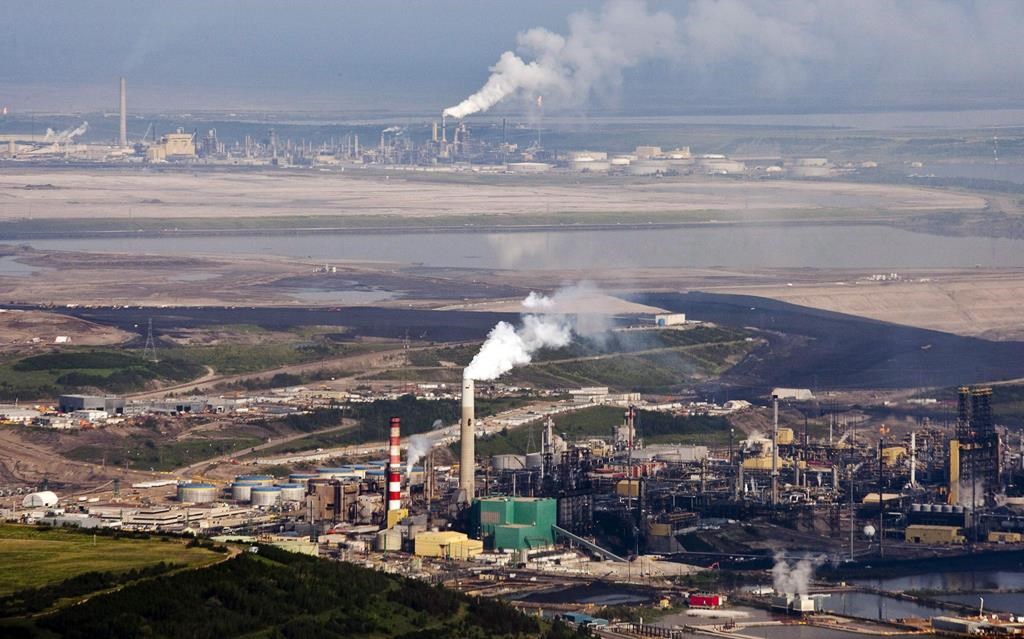On Monday, Alberta’s chief medical officer Dr. Deena Hinshaw addressed concerns being brought up regarding employees being in close quarters at work camps and construction sites amid the COVID-19 pandemic.

She said each area is unique, however, some basic steps companies should take include making sure social distancing is happening and cancelling buffet-style dining.
“If there are gatherings of people up to 50, that they’re able to socially distance, so they’re more than two metres apart,” Hinshaw said.
“Those are the kinds of things that are important to make sure that risk is mitigated.”
She said that at the moment she believes there is no “undue risk” to workers at camps, but that Alberta Health is assessing the situation every day.
“If we feel more measures need to be taken, we will put those in place,” Hinshaw said.
Energy Minister Sonya Savage addressed the issue Tuesday morning on Twitter.
“I’m aware there are questions about oil sands work camps during COVID-19,” Savage tweeted Tuesday afternoon. “Our first priority is the health and safety of those who reside in oilsands work camps.”
Savage added there would be changes coming to food service operations and transportation methods with regards to Alberta’s oilsands camps.
“The oilsands are of strategic importance to not just Alberta, but all of Canada. Further information will become available on their continued operations in the days to come,” a follow-up tweet from Savage said.

In an attempt to help flatten the curve and keep employees healthy, a number of oil and gas companies operating in Alberta said they are making changes in the name of social distancing.
Syncrude
Will Gibson, Syncrude‘s media relations officer said the company doesn’t have work camps, as roughly 90 per cent of its staff are local to Fort McMurray. Some work in offices in both Edmonton and Calgary – but non-essential workers at all sites have been sent home.
“We’ve done this to reduce the number of people that are on our site,” Gibson said.
So who’s considered essential? That’s anyone required for safe and reliable production, he said, including heavy equipment operators and power engineers, for example.
Meal times are being staggered to reduce the number of people in the lunchrooms and while busing to site, employees are asked to consider social distancing.
Syncrude says any employees feeling unwell are being asked to stay home.
The company has instituted its internal pandemic plan, which was developed following the SARS outbreak and used most recently during the Fort McMurray wildfires.
Gibson said Syncrude is not currently looking at closing, however operations were shut down during the wildfires in 2016.
Suncor
A senior advisor of issues management at Suncor, Erin Rees, said her company sent non-essential staff home ten days ago.
Suncor is also working with lodging providers, she said, to ensure all staff get hand sanitizer before entering dining rooms, which are now full service instead of self-serve buffets.
Meal times are being spaced out and both tables and chairs have been moved to promote social distancing.
There’s also increased cleaning at high-touch points and the gyms and common areas are closed, Rees said.
When it comes to bathrooms, instead of sharing with another worker, Rees said workers now have their own bathrooms.
Suncor has also brought in additional bus drivers and buses to allow for social distancing, as well as additional cleaning.
For flights up to sites, Suncor is working with Westjet to reduce how many people are on each plane.
Inter Pipeline
Inter Pipeline‘s director of corporate communications, Breanne Oliver, said things are rapidly changing – but as of Monday afternoon, the company does not have any confirmed cases of COVID-19 among staff.
At the Heartland Petrochemical Complex in Fort Saskatchewan, Inter Pipeline has increased busing services to encourage social distancing.
It has also reduced the lunchroom capacity to a maximum of 50 people and hand washing is encouraged.
Oliver said cleanings are occurring more frequently with specific cleaning supplies.
Canadian Natural Resources
Julie Woo, with CNRL‘s public affairs branch said the company has a pandemic response plan in place which includes a number of precautions.
Those include pre-screening criteria (travel history review and temperature checks) for access to Canadian Natural’s site by air or bus.
Woo said there is enhanced cleaning of all transportation related areas, as well as staggered flights.
At meals, additional space has been made between tables and staff are serving meals to employees, and packaging what they can individually.
Oil Sands Community Alliance
The Oil Sands Community Alliance formed in 2013 with 15 industry members in the Athabasca oil sands area as a division of the Canadian Association of Petroleum Producers.
According to a statement from executive director Karim Zariffa, members are encouraging employees to conduct COVID-19 self assessments daily.
Anyone showing symptoms is asked to tell their manager and isolate to their own room and bathroom. Meals will be delivered to them.
Non-essential staff are being told to work from home and business travel that isn’t required should be cancelled.
Meal and flight times are being staggered to minimize exposure possibilities and buses should be moving with reduced capacity.
OSCA is also encouraging companies to look at scheduled turnarounds and potentially postpone them.


Comments